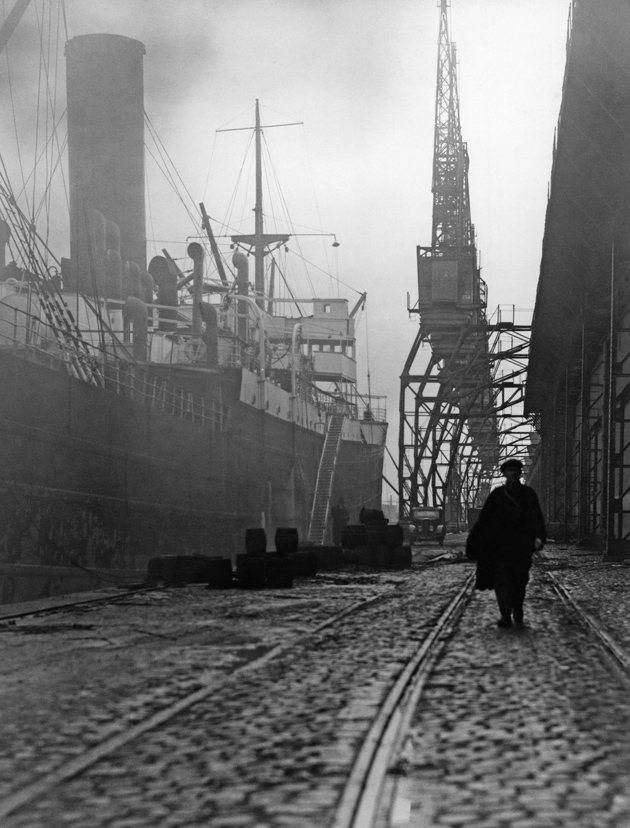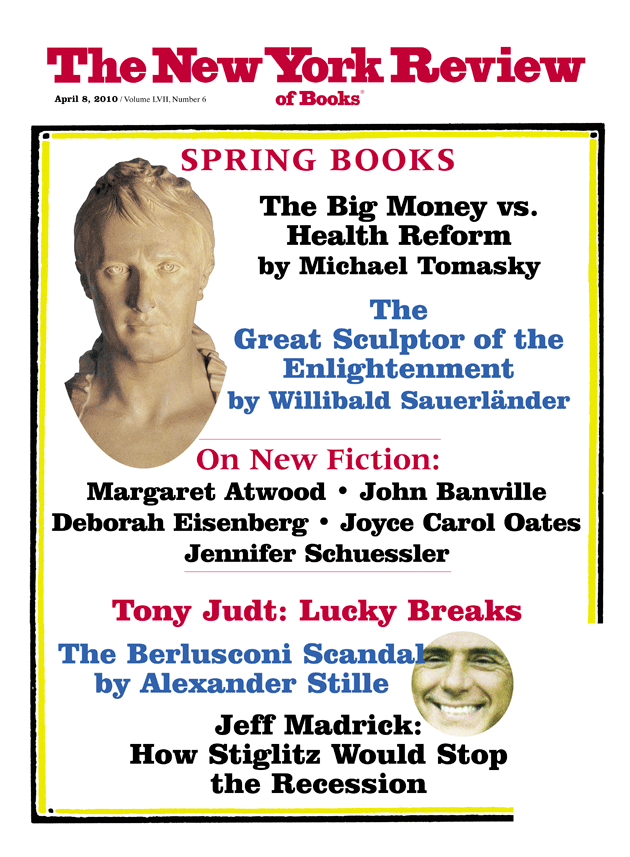I always wanted to be a historian. I was twelve when I began calculating how long it would take to accumulate the necessary degrees. How did historians earn a living? The only one my family had ever seen was A.J.P. Taylor—and while I assumed that he got paid for his stylish television lectures, I never supposed that most historians got by thus. How did one make a “career” in history? Indeed, how does one “make a career”? Do you plan it, starting at puberty? Does it just happen? What if it doesn’t? There was a future in there somewhere, but until then I had to earn money.
My first job was in the music department of W.H. Smith Booksellers in London: at fourteen, I was only permitted to work Saturdays. The chief attraction was seventeen-year-old April. She ran the counter and resembled Janis, the television pop music panelist who acquired fleeting national celebrity for her trademark assessment of the latest pap: “Oi’ll give it foive!”
We were still BBE (Before Beatles Era) and the shelves were stocked with forgettable Elvis imitations. The American originals—Gene Vincent, Eddie Cochrane—were a cut above their pale English counterparts (Cliff Richard, already something of a joke, Adam Faith, and a dozen others). Jazz was a minority taste, folk virtually unknown—at least in Putney High Street, where I worked. It was 1962 but the 1950s were still going strong.
Four years later, having secured a place at Cambridge, I dropped out of high school and arranged to work my passage to Israel on a freighter. The boat was due to pass through the Kiel Canal, which bisects the Holstein peninsula a few kilometers north of Hamburg. Tramp steamers keep irregular schedules—when I arrived at the Kiel docks the Hechalutz (en route from Gdansk) was nowhere to be seen: it was “expected.” I found a bed in a local hostel, checking the port and the canal locks every few hours.
Kiel was grim. Wartime damage had been made good, but the result—as so often in postwar West Germany—was a charmless urban space shorn of history or variety. The hostel was unwelcoming: expelled onto the streets directly after breakfast, I was not readmitted until dusk. My money was stolen by a fellow resident; nocturnal visits to the dock, awaiting the incoming tide and its attendant ships, were fueled by sausage sandwiches—courtesy of a sympathetic stall-keeper. At last, the Hechalutz loomed through the Baltic mist. For an indulgent moment, shoulders hunched against the wind, I saw myself as Gabin in a Marcel Carné film: Le Quai des Brumes, perhaps.
The captain greeted me suspiciously. I was on his manifest, but he had no idea what to make of this eighteen-year-old wayfarer. “What can you do?” he asked. “Well,” I responded, “I speak French, German, and some Hebrew”—as though applying for a temping job in a translation agency. “Me too; az ma (so what)?” came the contemptuous reply. I was shown my cabin and told to report to the engine room the following morning. There, and for the next four weeks, I worked the 8 AM–4 PM shift down among the deafening pistons. A diesel engine on an ocean-going vessel is largely self-maintaining: there was just one engineer on duty, overseeing the assorted dials, levers—and me. The machinery emitted a thick film of grease. My job was to clean it.
For the first few days I alternated between scrubbing diesel boilers and throwing up in the teeth of a North Sea blizzard. Eventually I acclimatized. There was no choice—I could not have graduated to deck work. The bosun (a sullen Israeli, built like a dwarf tank) did once order me to roll some barrels under cover in anticipation of an approaching squall. I could not budge them and was dismissively returned to my subterranean labors. On the last night of the voyage, the captain called me in and gruffly acknowledged that he was surprised: “I never thought you would last.” Me neither, I silently conceded.
Unskilled manual labor on a ship had its compensations. I spent the graveyard watch up on the bridge with the third mate, a few years my senior, listening to pirated pop music transmitted from Spain, Portugal, and Morocco, as the little boat pitched into the storms and swells of the eastern Atlantic. In Cyprus I was introduced to “the nicest ladies in Famagusta” and that same evening (as the youngest person aboard) shaved my mustache and dressed up as “the nicest lady on the Hechalutz ” for the entertainment of the suspiciously enthusiastic crew. My very own sentimental education.
Back home, working in a Sussex brickyard, I revised my views on manual labor: there is nothing noble about unskilled physical work. It is hard and dirty and mostly unrewarding; the incentive to avoid supervision, cut corners, and do the minimum is rational and irresistible. As soon as I could, I swapped the brickyard for a series of driving jobs: semiskilled—though no better paid—these at least afforded me autonomy and privacy. Between 1966 and 1970 I worked variously as a deliverer of carpets, warehouse supplies, and domestic dry goods.
Advertisement
Looking back on my days ferrying groceries around south London, I am struck by how compact the orders were. A typical household would take no more than two small boxes a week. For everything else the housewife shopped daily at a neighborhood greengrocer, dairy, butcher, or poulterer. Supermarkets were almost unknown. Bulk purchases made no sense: most people had tiny refrigerators, some had none at all. In my green Morris van, the grocer’s family name proudly emblazoned on its side, I could carry up to two dozen orders at a go. Today, a typical outing to the mall would fill the little Morris with one household’s weekly supplies.
For two summers at the end of the 1960s I abandoned my trucks for guided tours, escorting American student tourists around Western Europe. The pay was moderate, the benefits distinctive. In those days, girls from nice American families did not travel overseas alone; parents preferred to reward graduation with a European holiday in the company of like-minded young women and a reliable chaperone.
The company I worked for boasted of employing only Oxbridge undergraduates: mysteriously, we were thought uniquely suited to the task of escorting upward of forty American coeds on a nine-week vacation. All of the girls on these tours were either in college or had recently completed it, yet none of them had ever traveled outside the continental US. Europe, even the best-known bits (Paris, London, Rome), was utterly unfamiliar.
One night in the Waldstätterhof Seehotel on Lake Lucerne, I was awoken at 5 AM by a panic-stricken tour member. “Come quickly—someone’s trying to break in to Lizbeth’s room!” Two floors down, the night porter was hammering angrily at a bedroom door, incoherently sputtering a man’s name. I brushed him aside, announced myself, and was let in. Lizbeth was standing on the bed wearing nothing very much. “He’s going to kill us!” she hissed. Us? She pointed at the cupboard from which emerged a blond-haired young man in underpants: the hotel sous-chef. “It’s me he wants,” the boy explained sheepishly in German. I conveyed the situation to his American host; she was utterly bewildered. “There are men,” I clarified, “who are attracted to other men.” Magnificently indifferent to her diaphanous appearance, Lizbeth stared at me in disgust: “Not in Biloxi there aren’t.”
This was July 1968. In Munich later that month, I instructed our German bus driver to take us to the Dachau memorial. Horst refused point-blank: nothing worth seeing there, he assured me, and anyway it’s all American propaganda. The Holocaust and the camps were not yet a universal moral reference, and there were no homosexuals in Mississippi. It was all a long time ago.
My last job was at the Blue Boar, a hotel then gracing the center of Cambridge. Responsible for breakfasts, I worked the kitchen from 5:30 AM until the lunch crew arrived. There were no coeds, but otherwise it was the ideal nonacademic appointment. Like Czech intellectuals consigned to boiler rooms in the years of “normalization” (but in my case by choice), I found this sort of work ideally suited to serious reading. Between preparing the toast, boiling the coffee, and frying the eggs for traveling salesmen and visiting parents, I read much of the background material for my doctoral dissertation. Once mastered, short-order cooking does more than allow for the life of the mind: it facilitates it.
Conversely, the para-academic drudgery normally forced upon impecunious scholars—high school history coaching, adjunct lecturing, or exam grading (I have done them all)—occupies the mind while offering no intrinsic satisfaction. You can think complicated thoughts while trundling a lorry-load of carpets around the suburbs; but working against the clock to grade exams by the page leaves room for little else.
From the Blue Boar, I went directly to a Fellowship at King’s College, Cambridge. There was nothing inevitable about this: I had been rejected from Fellowship competitions everywhere I applied and would surely have taken up permanent employment of a very different sort had King’s not rescued me. The serendipity of this outcome left me with a lasting insight into the precariousness of careers: everything might have been different.
I don’t suppose I would have spent the rest of my life making toast at the Blue Boar, delivering carpets, or cleaning diesel engines. It’s even unlikely that I would have made a career out of escorting young women around Europe, however tempting. But it seemed that I might have to fall back on one or more of these for an indefinite period—a prospect that has left me distinctly sympathetic to those who, for reasons of chance or misfortune, find themselves on the wrong side of the line.
Advertisement
We remain in thrall to the industrial-era notion that our work defines us: but this is palpably untrue for the overwhelming majority of people today. If we must invoke nineteenth-century clichés, better to recall “The Right to Laziness”: an unintentionally prescient 1883 pamphlet by Marx’s son-in-law Paul Lafargue suggesting that modern life will offer ever more opportunities for self-definition through leisure and avocation. Mere employment will occupy a thankfully diminishing role.
I ended up doing what I had always wanted to—and getting paid for it. Most people are not so fortunate. The majority of jobs are tedious: they neither enrich nor sustain. All the same (like our Victorian predecessors), we once again regard unemployment as a shameful condition: something akin to a character defect. Well-paid pundits are quick to lecture “welfare queens” on the moral turpitude of economic dependence, the impropriety of public benefits, and the virtues of hard work. They should try it some time.
—This piece is part of a continuing series of memoirs by Tony Judt.
This Issue
April 8, 2010



